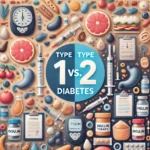💊 What is Hypoglycemia?
Hypoglycemia occurs when blood sugar levels drop below normal, typically below 70 mg/dL, and as a result, disrupt your body’s ability to function optimally.
Hypoglycemia mainly occurs whenever there is an imbalance between the amount of insulin and the available glucose in the bloodstream. Typically, excessive insulin production or insulin action relative to the body’s current glucose levels, leads to rapid uptake of glucose into cells and insufficient levels remaining in the bloodstream.
Although this condition is often seen in people with diabetes – mainly due to insulin or other glucose-lowering medications, hypoglycemia can also occur without diabetes due to prolonged fasting, excessive alcohol consumption, severe illness, or a hormonal imbalances that affect glucose regulation.
Effects of Hypoglycemia
The brain is particularly vulnerable to low glucose levels, as it relies almost exclusively on glucose for energy, and this is why symptoms like confusion, dizziness, and even seizures can occur.
Here are some Stats about Hypoglycemia
- Diabetes: Studies suggest that up to 20% of people with type 1 diabetes and 10% with type 2 diabetes on insulin therapy experience at least one episode of severe hypoglycemia annually. Mild episodes are even more frequent, underscoring the importance of understanding and managing this condition.
- Reactive Hypoglycemia: In non-diabetics, reactive hypoglycemia (low blood sugar that occurs within a few hours after eating) is reported in about 2-5% of the general population. This type is usually triggered by a high carbohydrate meal that causes an excessive insulin response.
- Hospital Visits: Hypoglycemia accounts for about 1-2% of emergency department visits in non-diabetic individuals. These cases often result from fasting, alcohol use, or critical illnesses.
- Prevalence in Specific Groups: Hypoglycemia is more prevalent in the elderly, individuals with chronic kidney disease, or those taking medications like beta-blockers or antibiotics that can lower blood sugar.
🤔 Why you need to know:
Understanding hypoglycemia is important because it can lead to serious complications if not managed promptly. Here are practical steps to prevent and treat hypoglycemia:
- Monitor Blood Sugar: Regular monitoring, especially for individuals with diabetes, can help detect low blood sugar early.
- Carry Quick Carbs: Keep fast-acting carbohydrates like glucose tablets, fruit juice, or candy on hand to quickly raise blood sugar levels if they drop.
- Eat Regular Meals: if you are prone to hypoglycemia, consuming balanced meals with a mix of carbohydrates, protein, and fats helps maintain stable blood sugar levels.
- Know Your Medications: Be aware of how your medications affect your blood sugar and adjust your diet or activity level accordingly.
🧠 Trivia:
The ancient Greeks were among the first to document the effects of hypoglycemia, although they didn’t know it by name. They observed that gladiators and athletes would consume honey or figs before competitions to prevent sudden weakness and fainting, essentially using an early form of glucose therapy to combat what we now understand as hypoglycemia



